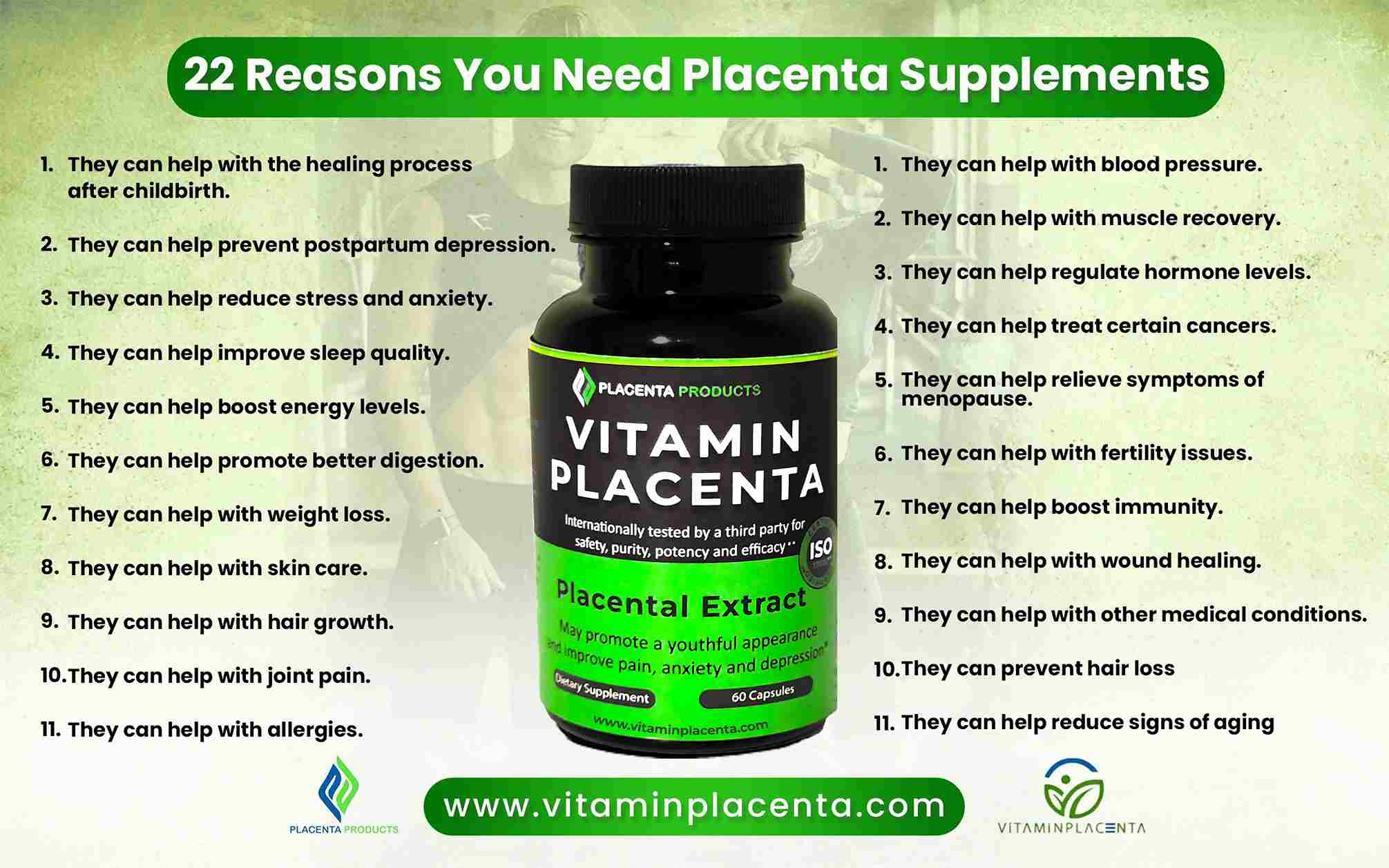Placenta Pills in Traditional Chinese Medicine: Ancient Practice Meets Modern Wellness

-
What is Traditional Chinese Medicine?
Traditional Chinese Medicine (TCM) is one of the world’s oldest healthcare systems, with a history that stretches back over 2,000 years. Unlike modern Western medicine, which often focuses on treating specific symptoms or conditions, TCM takes a more holistic approach. It emphasizes the importance of balance within the body and seeks to restore harmony across various systems. Practitioners of TCM believe that when energy, or qi, flows freely through the body, health and wellness naturally follow (Qiu, 2007). To achieve this balance, TCM uses natural remedies, such as herbs, minerals, and animal-derived substances, including the placenta.
In TCM, placenta, known as zi he che (紫河车), has long been revered for its powerful health benefits. This natural substance, which sustains life in the womb, is believed to hold regenerative powers that can help replenish energy, improve resilience, and support long-term vitality. By converting placenta into capsule form, the practice of consuming it has been adapted for modern wellness enthusiasts, who seek both convenience and the reassurance of ancient tradition in their supplements.
-
Historical Context of Placenta Use in TCM
Early Texts and Records
The use of placenta as a medicinal substance in TCM can be traced back to some of China’s most influential ancient medical texts. One of the most famous of these texts is the Compendium of Materia Medica (Bencao Gangmu), written by Li Shizhen in the 16th century. This monumental work is considered one of the most comprehensive accounts of Chinese herbal medicine and categorizes placenta as a tonic substance. According to the Compendium, placenta could be used to replenish energy, support recovery after childbirth, and boost the immune system (Unschuld, 1986). The idea of consuming placenta may seem unusual to modern readers, but in TCM, it is believed to offer a powerful way to restore health and vitality.
Historical Practices and Beliefs
Historically, placenta consumption was commonly practiced by new mothers in Chinese society as a natural method of replenishing strength, energy, and overall well-being after the physical demands of childbirth. For postpartum women, taking placenta was seen as a way to accelerate recovery and support their bodies in adapting to the demands of new motherhood. TCM practitioners often prescribed placenta for its "blood-tonifying" effects, which they believed helped restore balance and prevent symptoms of blood deficiency, such as fatigue, weakness, and paleness (Dharmananda, 2004).
TCM’s Holistic Philosophy
Placenta consumption aligns closely with the TCM belief in supporting the body's vital energies. TCM holds that life force is carried by two essential elements: qi and jing. Qi represents the energy that sustains all bodily functions, while jing, or essence, is a more concentrated form of energy believed to be responsible for growth, development, and reproductive health. According to TCM, jing gradually depletes with age, so practices and remedies that nourish jing are highly valued. Placenta, which sustains new life in the womb, is thought to be one of the most potent sources of jing, making it a traditional choice for individuals seeking to maintain health, fertility, and longevity (Zhang, 1990).

-
Placenta Pills: Modern Adaptations of an Ancient Practice
Preparation of Placenta Pills
The ancient practice of consuming placenta has been modernized to appeal to contemporary consumers. Today, instead of consuming it in raw or cooked forms, placenta is dried, ground into powder, and encapsulated, making it easier to incorporate into daily routines. The process of placenta encapsulation helps preserve the active compounds in the placenta while ensuring consistent dosage and potency. This adaptation allows individuals to benefit from the age-old practice of placenta consumption without the challenges of traditional preparation methods (Kim, 2014).
Safety and Standards in Modern Placenta Products
In recent years, companies have sought to meet the growing demand for placenta-based supplements by producing products that adhere to strict safety and quality standards. For example, products like Vitamin Placenta are manufactured in facilities certified by Good Manufacturing Practices (GMP) and compliant with ISO standards for quality assurance. These certifications provide assurance that the products are safe, effective, and free from harmful contaminants. This standardization aligns with the principles of both TCM and modern wellness practices, offering consumers a trustworthy way to explore placenta’s health benefits (Vitamin Placenta, 2024).

-
Key Health Benefits of Placenta Pills in TCM Perspective
Tonifying Blood (补血)
In TCM, blood is considered the source of nourishment for the entire body. Blood deficiency, a common diagnosis in TCM, can lead to symptoms such as fatigue, poor circulation, and a weakened immune system. Placenta is traditionally prescribed as a blood-tonifying agent to help replenish energy, enhance blood circulation, and support the recovery process after childbirth. For postpartum women, it is believed that placenta supplements can help replace the blood and nutrients lost during labor, aiding in faster recovery and improved vitality (Dharmananda, 2004).
Supporting Qi and Jing
Placenta is revered in TCM for its ability to replenish both qi and jing, the essential life forces that are fundamental to health and well-being. When qi and jing are depleted, the body is believed to become more susceptible to aging, illness, and physical weakness. Consuming placenta is thought to reinforce these vital energies, supporting the body’s resilience against the physical and mental stresses of aging. This connection with youthfulness and vitality has made placenta a popular choice in TCM for those seeking a long, healthy life (Qiu, 2007).
Strengthening Immunity and Overall Vitality
In TCM, the immune system’s strength is closely linked to the body's overall balance and harmony. Placenta supplements are believed to help the body fortify its defenses by nourishing qi and promoting equilibrium across bodily systems. The placenta’s nutrient-rich composition supports this balance, which in turn contributes to overall health, endurance, and vitality (Kim, 2014).
-
Modern Scientific Insights on Placenta Benefits
Hormones and Peptides in Placenta
Modern science has found that the placenta contains numerous bioactive compounds, including peptides, growth factors, and hormones. Research has shown that the hormone CRH (corticotropin-releasing hormone), present in placenta, may play a role in reducing stress by modulating the body’s response to stressors (Benyshek et al., 2013). This hormonal activity suggests potential benefits for mental well-being, including relief from postpartum depression and anxiety. In TCM, this aligns with the traditional view of placenta as a substance that can bring balance to both body and mind.
Effects on Skin, Hair, and Nails
The placenta’s rich content of growth factors has prompted studies exploring its effects on skin, hair, and nails. These growth factors are believed to stimulate collagen production, which helps maintain skin elasticity and promotes hair and nail strength. Research has suggested that placental extract can support cellular regeneration, making it a popular choice in both cosmetic applications and anti-aging supplements (Park et al., 2018).
Cognitive and Mood Benefits
In addition to its physical benefits, consuming placenta has been associated with potential improvements in cognitive function and mood stability. Certain compounds in placenta may influence neurotransmitters, such as serotonin, which are critical for mood regulation. This aligns with TCM’s holistic approach, where mind and body are seen as interconnected (Benyshek et al., 2013).

-
Placenta Pills for Both Men and Women: Expanding TCM Applications
TCM’s Approach to Gender-Neutral Benefits
While placenta is often associated with postpartum recovery, TCM practitioners regard it as a beneficial supplement for both men and women. TCM attributes particular importance to the kidneys as a source of vitality and physical endurance, and placenta is considered an effective tonic for strengthening kidney energy. For men taking placenta supplements may help support energy levels, promote mental clarity, and improve resilience to physical and emotional stress (Zhang, 1990).
Hormonal Balance and Stress Relief
Placenta’s potential to modulate stress hormones makes it an attractive option for both men and women seeking natural methods to manage stress. Studies suggest that placenta’s bioactive compounds may help regulate hormonal fluctuations, supporting mental clarity and emotional resilience. This reflects TCM’s broader philosophy of using natural remedies to support mental health and balance (Kim, 2014).
-
Integration of TCM with Modern Wellness Practices
Placenta Pills as a Bridge Between TCM and Western Health Trends
In recent years, TCM principles have gained traction in Western health and wellness trends. Placenta pills are an example of this integration, appealing to those who value holistic approaches to health. Western wellness practitioners increasingly recognize the benefits of TCM’s natural, body-centered remedies, finding that they offer unique, effective solutions for energy, immunity, and longevity (Qiu, 2007).
Contemporary Holistic Practices
Alternative medicine and naturopathy often incorporate elements of TCM, creating an environment in which placenta pills are valued for their traditional roots and potential health benefits. As a bridge between ancient wisdom and modern science, placenta supplements allow individuals to explore natural wellness options that support their lifestyle and health goals (Benyshek et al., 2013).
-
Safety, Ethical, and Cultural Considerations
Ethics and Sourcing
The use of animal-based substances in TCM requires ethical consideration, especially when it comes to sourcing placenta. Companies producing placenta supplements must ensure transparency in their sourcing practices, honoring both cultural respect and sustainability. For example, Vitamin Placenta prioritizes ethical sourcing and production standards, offering consumers peace of mind in their choice of wellness products (Vitamin Placenta, 2024).
TCM’s Perspective on Balance
TCM teaches that even beneficial supplements should be used mindfully, aiming for balance rather than excess. This philosophy encourages individuals to incorporate placenta supplements as part of a balanced lifestyle, complementing other health practices such as diet, exercise, and stress management.

-
Summary of Placenta Pill Use in TCM
Reflecting on the Past and Future of Placenta Use
Placenta pills represent a fascinating blend of ancient and modern wellness practices. Drawing on the wisdom of TCM, these supplements provide a way for people to explore natural methods for maintaining energy, resilience, and vitality. As more individuals turn to holistic health practices, placenta supplements offer a unique path toward achieving balanced wellness.
Encouraging Informed Decisions
For those considering placenta supplements, consulting with TCM practitioners or healthcare providers can provide valuable guidance. With a balanced approach, individuals can incorporate placenta pills into their wellness routine in a way that aligns with their personal health goals and respects the principles of both traditional and modern practices.
-
Vitamin Placenta: Bridging Traditional Wisdom and Modern Science
The journey of placenta pills from an ancient remedy to a modern wellness product represents the blending of traditional Chinese wisdom with today’s scientific advancements. A prime example of this evolution is Vitamin Placenta, a product that embodies the spirit of TCM while adhering to the rigorous safety and quality standards demanded by modern consumers. Vitamin Placenta offers a unique way for individuals to access the health benefits of placenta consumption, making it approachable, safe, and effective for a diverse range of people.
From Ancient Roots to Modern Production
In TCM, placenta has been valued for centuries as a potent tonic capable of enhancing energy, supporting immune function, and promoting overall vitality. Traditionally, placenta was dried and used in its raw form, often prescribed by TCM practitioners to boost recovery post-childbirth and strengthen life force, or jing. However, as science progressed and dietary supplements gained popularity, there was a growing interest in reimagining these age-old practices in a way that met contemporary health and safety standards.
Vitamin Placenta is one such modern innovation. It takes the wisdom of TCM and elevates it to meet today’s standards for quality, efficacy, and consistency. Unlike traditional methods, which might vary in preparation and potency, Vitamin Placenta is manufactured in a GMP-certified facility and meets ISO 17025 certification for quality, safety, and transparency. This level of compliance ensures that each batch of Vitamin Placenta is rigorously tested, guaranteeing a consistent experience and maintaining the integrity of the supplement. This evolution in production not only enhances safety but also provides consumers with a reliable, trustworthy option in a market where traditional remedies are often seen as unregulated.

Science-Based Benefits and Holistic Wellness
Vitamin Placenta encapsulates both the wisdom of TCM and the precision of modern science. The supplement leverages the placenta’s natural components, such as peptides, growth factors, and hormones, which research suggests can support physical, mental, and emotional well-being. The presence of compounds like CRH (corticotropin-releasing hormone) has shown potential for stress modulation, echoing TCM’s perspective of placenta as a balance-restoring remedy. Additionally, the supplement’s effects on skin, hair, and nails reflect TCM’s belief in jing as the essence that promotes longevity and rejuvenation.
For those drawn to holistic wellness, Vitamin Placenta offers a way to experience the full scope of placenta’s potential benefits. By aligning TCM’s principles of energy balancing with modern wellness trends, Vitamin Placenta appeals to a broader audience interested in alternative health solutions. It provides benefits that go beyond traditional uses, addressing modern concerns like stress management, skin aging, and overall vitality, making it a versatile choice for individuals looking to support various aspects of their health.
Meeting Today’s Ethical and Cultural Standards
One of the significant challenges in translating an ancient practice into a modern product is navigating ethical and cultural concerns. Vitamin Placenta meets this challenge by prioritizing ethical sourcing and transparency in its manufacturing processes. Consumers can trust that the product is created with respect for both TCM traditions and modern values around sustainability and animal-derived ingredients. This commitment not only honors the origins of the remedy but also makes it accessible to today’s mindful consumers, who value products made with integrity and care.
Vitamin Placenta serves as a bridge between ancient TCM practices and contemporary wellness needs, illustrating how traditional remedies can be responsibly adapted for modern use. For many consumers, it offers a way to reconnect with the holistic healing practices of the past, backed by the scientific insights of today.
Conclusion: A Product for Modern Wellness with Ancient Roots
Vitamin Placenta is a testament to the enduring appeal of TCM and the adaptability of its principles in a rapidly changing world. It represents the evolution of placenta consumption from a specialized TCM treatment to a mainstream wellness product, embodying the potential of traditional wisdom to address modern health needs. With its careful adherence to safety and ethical standards, Vitamin Placenta exemplifies how age-old remedies can find a place in today’s wellness landscape, offering a balanced, natural approach to health and vitality.
References
- Benyshek, D. C., et al. (2013). "Human maternal placentophagy: a review." Ecology of Food and Nutrition, 52(2), 93-115.
- Dharmananda, S. (2004). "Placenta as a tonic." Institute for Traditional Medicine.
- Kim, S., et al. (2014). "Bioactivity of placenta extract in healthcare and cosmetic applications." International Journal of Molecular Sciences, 15(5), 7810-7833.
- Park, M., et al. (2018). "Effects of human placental extract on skin cell regeneration." Journal of Cosmetic Dermatology, 17(5), 806-813.
- Qiu, J. (2007). "Traditional Chinese medicine: a treasure chest of medicine for the world." Nature, 448(7150), 126-128.
- Unschuld, P. (1986). Medicine in China: A History of Pharmaceutics. University of California Press.
- Vitamin Placenta. (2024). "About Us." Retrieved from https://www.vitaminplacenta.com/products/vitamin-placenta
- Zhang, A. L. (1990). Fundamentals of Traditional Chinese Medicine.

